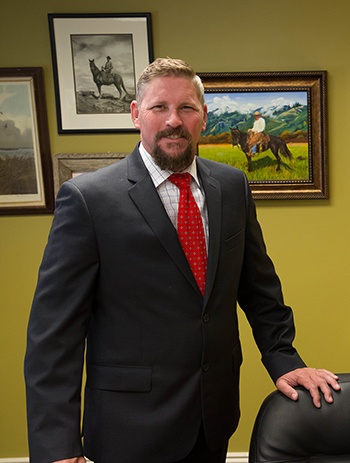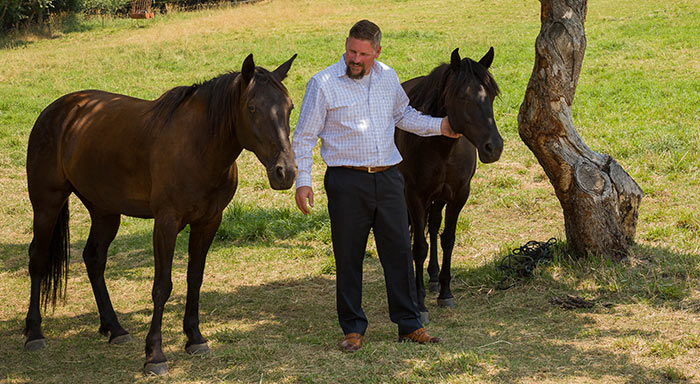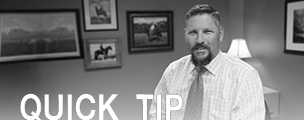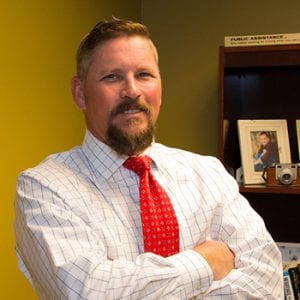Cultivating strong and enduring client relationships
Cultivating strong and enduring client relationships

Summit Capital Services LC • Questar Capital Corporation
Read full biography below
My second story relates to my love of horses. I have been involved with raising and training horses for a long time, and I love riding. Raising a horse successfully requires a caring attitude, dedication, and effort, and there are several specific steps that need to be followed. In many ways, those same attributes come into play as I work with clients. A disciplined, detailed, and customized process needs to be followed, tempered by a great deal of personal concern and commitment.

I think an important part of our planning process happens early in the discovery phase, which involves learning about our clients’ financial lives and their attitudes about money and investing. What experiences have they had with investing in the past? What is their attitude about risk? What are their important life goals, individually, as a couple, and as a family? I want to dig deeply into all elements of their financial behavior and relevant data, including household budgeting, their current accounts and retirement savings, and their assets and liabilities. Do they have adequate protection in place? Does educational funding fit into the picture or, potentially, elder care? What do they see themselves ideally doing in retirement? What sort of legacy is important to them, whether it is for family, church, or charity? These are the types of issues we will discuss thoroughly.
I have used many financial-planning approaches and different types of planning software over the years. I like to think I have been able to customize my planning process using the best practices from several resources. I believe that an 80-page planning document that sits on a shelf and is never looked at has very little value for clients. I want our process to be interactive and one that can be distilled down to some important core concepts that clients can firmly grasp.
I spend a lot of time with clients explaining our foundational approach to financial planning, which we then apply to their specific situation and customize as needed. It is essentially a variation on the “bucket planning” approach for retirement-income planning. This comprehensively identifies assets and liabilities, potential income streams, estimated ongoing expenses and tax liabilities, and assumed return assumptions. We can then strategize together to find viable solutions for any potential income gaps that the analysis shows, with consideration of short-term, mid-term, and long-term “buckets.”
This process, I believe, is very logical and comprehensive. Clients can work through the data and assumptions with me, seeing how their plan has moved from its initial starting point to very specific implementation strategies. The process is educational, relatively easy to comprehend, and helps facilitate client “ownership” of their financial plan.
The managers I work with have a specific predetermined protocol for buying and selling for their strategies based on current market conditions. I like that this takes emotion out of the equation, as well as manager bias. We are not expecting to “beat the market” or exit the market at exact tops, but rather to give clients an investment experience that is less volatile and smoother over the long term.
I use several different resources for their money-management expertise. I am well-versed in their strategy development processes and have confidence in their management, investment teams, and management styles. Their philosophies, especially as they pertain to a focus on risk management, align well with what we are trying to achieve for our clients.
I have learned that people usually look to find a financial advisor for a very specific reason that has been on their mind for some time. Yes, many people want to start planning for their retirement in a general sense, but there are usually also concrete issues behind that. It could be a change in their career or loss of a job, it might be a divorce or death in the family, or it could be concerns over funding college education for their children or helping their aging parents.

Another point I think is important in relationship building is having some shared values. My family is the most important thing in the world to me and what keeps me going every day. My wife and I consider our ultimate responsibility to be raising our children to be happy, productive, and responsible—helping them explore what is personally important in their lives. I think this attitude carries over to my practice, as I work with clients to find out what they value the most in life and how that can inform their financial-planning priorities. I take great pride in the fact that clients place their faith in our firm to help guide them and that they feel comfortable recommending our services to their friends and family.

A process-driven approach to client discovery
Michael Mason, founder of Summit Capital Services LC, provides holistic financial planning to clients, with a focus on retirement planning. A cornerstone of his practice is developing highly personalized relationships with clients, digging deeply to discover clients’ important life and financial objectives. In the discovery process with clients, he explores the following areas, which he summarizes with the acronym FORM:
- Family (F): What are the high-concern areas and dreams the client has for their family? Do they need to plan for educational expenses? What are their priorities in legacy planning?
- Occupation (O): How long does the client plan to work? Do they have any plans for a career change? Do they envision having a second or third career in retirement?
- Recreation (R): What is important in their lives outside of family and work? Do they have specific future goals for travel, a vacation home, or pursuing a hobby? Are they involved with their church? Do they see themselves being involved in volunteer or charitable activities?
- Money (M): How do they handle their money? Are there cash-flow or budgeting issues? What are their prior experiences with investments? Their attitudes around risk? Do “gaps” exist in their expected retirement income?
Michael Mason is the founder of Summit Capital Services LC, located in Bountiful, Utah. He is an investment advisor representative with Questar Asset Management and holds life and annuity insurance licenses. He says his practice focuses on retirement-income planning and that he strives to “provide strategies designed to allow clients to grow, manage, and preserve their assets.”
A native of Utah, Mr. Mason was one of five children and says he “grew up in a great family atmosphere where everyone pitched in to help each other.” He earned a bachelor’s degree in the parks, recreation, and tourism program from the College of Health at the University of Utah. He says he has always had “a great love of the outdoors” and was initially interested in a career in recreation or land management. However, a college internship for a national financial-services firm, along with a strong interest in investing and finance, led Mr. Mason to enter the financial industry full-time after college.
Mr. Mason has more than 20 years of experience in financial services and has held a number of significant positions, including representing major insurance firms, working in the banking channel, serving as an investment advisor, and establishing his own independent financial-advisory practice. He says he has enjoyed responsibilities in several of his positions for the recruitment, training, and mentoring of individuals entering the industry.
Mr. Mason and his wife have four sons, ranging in age from 8 to 22. His family is very active in their church and participates in charitable activities related to the church. Mr. Mason has several other interests, including raising and riding horses, backpacking, hunting, fishing, and especially boating. He says his family tries to get out on their boat at a local lake several times a week, and they greatly enjoy “spending both peaceful and very active time together.”
Disclosure: Securities offered through Questar Capital Corporation (QCC). Member FINRA/SIPC. Advisory services offered through Questar Asset Management (QAM), a registered investment advisor. Summit Capital Services LC is independent of QCC and QAM. Securities offered through Questar Capital Corporation (QCC). Insurance offered by Michael Mason.
Post-publication note: As of this update (July 1, 2020), Mr. Mason is registered with Woodbury Financial Services Inc.
Photography by Glen Ricks


